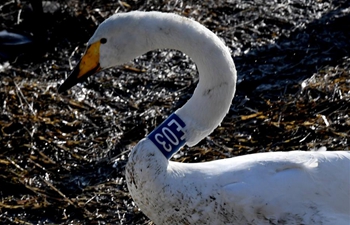BERLIN, Nov. 26 (Xinhua) -- Germany's environmental minister Svenja Schulze seeks to reduce plastic waste in Germany while promoting the use of recycling, a plan presented by the Federal Ministry for the Environment, Nature Conservation and Nuclear Safety (BMU) on Monday shows.
"With these measures, we are initiating a trend reversal in the use of plastics," said the environmental minister during the presentation of the governmental plan.
"We produce far too much plastic," said Schulze, arguing that this consumption behavior would be exported to emerging and developing countries with serious consequences especially for the marine environment.
The so-called five-point plan seeks, among other things, to "avoid unnecessary products and packaging".
The German government is supporting a European-wide ban on disposable plastic articles such as plastic dishware, which is to be adopted this year.
The German government also plans to introduce further financial incentives to promote the use of ecological packaging. According to Schulze, companies that use packaging that is recyclable or made from recycled materials will have to pay less charges.
According to an earlier report by the German Federal Environment Agency (UBA), Germans produced 18.16 million tons of plastic packaging in 2016, averaging 220 kg per capita, which is more than that of any other country in the European Union. Two years ago, numerous retailers in Germany jointly agreed to stop offering plastic bags free of charge which halved the amount of plastic bags used in Germany.
On Jan. 1, 2019, a new packaging law will come into effect in Germany. The law will increase the obligatory recycling rate for plastics from currently 36 percent to 58.8 percent. In 2022, this quota is scheduled to be further raised to 63 percent. In addition, the recycling quotas in Germany for other packaging materials such as paper, glass and metals are to be increased gradually.
The recycling rate of packaging materials varies greatly depending on the materials used.
According to UBA, 70 percent of packaging waste in Germany was recycled last year. With recycling rates around 90 percent, glass, aluminum, paper and steel are much more likely to find their way into the circular economy than plastics which are recycled at a rate of 49.7 percent. With a rate of 25 percent, wood products are the least recycled.
According to the German environmental ministry, the introduction of the new law will put Germany ahead of the EU's "new ambitious recycling quotas", which stipulate a recycling rate of 55 percent of household waste from 2025 onwards.












